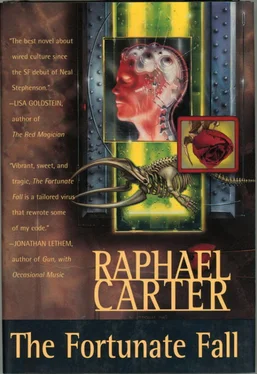Raphael Carter - The Fortunate Fall
Здесь есть возможность читать онлайн «Raphael Carter - The Fortunate Fall» весь текст электронной книги совершенно бесплатно (целиком полную версию без сокращений). В некоторых случаях можно слушать аудио, скачать через торрент в формате fb2 и присутствует краткое содержание. Город: New York, Год выпуска: 1996, ISBN: 1996, Издательство: Tor Books, Жанр: Киберпанк, на английском языке. Описание произведения, (предисловие) а так же отзывы посетителей доступны на портале библиотеки ЛибКат.
- Название:The Fortunate Fall
- Автор:
- Издательство:Tor Books
- Жанр:
- Год:1996
- Город:New York
- ISBN:0-312-86034-X
- Рейтинг книги:3 / 5. Голосов: 1
-
Избранное:Добавить в избранное
- Отзывы:
-
Ваша оценка:
- 60
- 1
- 2
- 3
- 4
- 5
The Fortunate Fall: краткое содержание, описание и аннотация
Предлагаем к чтению аннотацию, описание, краткое содержание или предисловие (зависит от того, что написал сам автор книги «The Fortunate Fall»). Если вы не нашли необходимую информацию о книге — напишите в комментариях, мы постараемся отыскать её.
“Gripping…. One of the most promising SF debuts in recent years”.
—“Publisher’s Weekly” starred review
The Fortunate Fall — читать онлайн бесплатно полную книгу (весь текст) целиком
Ниже представлен текст книги, разбитый по страницам. Система сохранения места последней прочитанной страницы, позволяет с удобством читать онлайн бесплатно книгу «The Fortunate Fall», без необходимости каждый раз заново искать на чём Вы остановились. Поставьте закладку, и сможете в любой момент перейти на страницу, на которой закончили чтение.
Интервал:
Закладка:
“Imagine that I were to hold up a half-silvered mirror between our faces—a sheet of glass painted with clear and reflective squares alternating like a chessboard, on a scale too small to see. Then you would see my face combine with your own, not statically, but fading in and out, and sometimes merging. The left eye of your reflection might appear, then disappear, to be replaced with mine, while all the time the right eye was a fusion of the two. If you looked at the mirror long enough, you might learn to control this process, to choose whose features you would see in which place; but at first, the faces would recombine randomly. That was how it was for my mind and the whale’s. Later I would discover how to switch between visual cortices, but at the time, I could only watch my field of vision slowly crossfade back and forth.
“When I saw through her eyes, I saw myself—rather flattened, and more scarred than I had guessed, but recognizable. Standing behind me, I saw Aleksandr Derzhavin. And I remembered. He had killed my mother before my eyes, and when the nets lifted me from the water, he had sponged her blood off of my skin with his own hands. He had brought me to this place, where I could only swim a few strokes at a time before I reached a wall and had to turn. He had put things into my skin that changed my shape, so that when I moved in the water, it resisted me, as though I were a stranger to it. He had changed my mind so that my thoughts became faint furtive things among a babble of human voices I could barely understand. And he had tied me to this pale, soft creature even lumpier than myself, this ill-designed monstrosity that would struggle in the water like a wounded fish, and whose mind, too, struggled against the world, as against an enemy.
“And why not kill him? It had not occurred to me before; and now I realized for the first time that this was strange. Derzhavin had done something to me, more than the obvious. I could see it— a black spot occluding the light. He had altered me to keep me from conspiring against him. But being who he was, he had not considered what the whale might feel. I could not hate him myself, in that crippled body slumped inertly in a chair. But in the mind of the whale, I hated him so purely that my hands and flippers trembled at the sight of him. And the whale, who could hate, but who was held back from the object of her hate by a pane of glass, could plan against him by borrowing my unasked-for oracular gift.
“And so I looked down at my hands, and concentrated on them, as I had concentrated on the chessboard earlier, until I saw the shining pathways start to spiral out. And slowly, taking our time—for we had all the time in the world—my whale-self and my man-self began to choose those futures in which we would kill him.”
“What did you do?”
“At first there was nothing we could do. I needed the use of my legs, and he puttered over that for months, until my man-self was simmering with impatience. Yet we waited. We waited until I could walk, and then we waited again for him to begin to trust me. Derzhavin was a suspenders-and-belt man from way back: even though he had made me, so he thought, incapable of disobedience, he still turned on my carapace only when he needed me. Other times I sat inert in this same chair, in this very room, like a child’s toy set aside.
“For a long time, all the paths I saw were parallel. No matter what I did, the result would be the same. But in the distance— months or years, I couldn’t tell—there was a branching with a death entangled in it, like a skeleton that a tree’s root has embraced. I watched this branching all the time that my man-self sat here motionless, and during the interminable chess games, and in physical therapy, as one pair or another of hands supported my flopping form in the shallow water. It seemed to get no closer. At times I would have sworn it was receding. And then one day, at the chessboard, I looked down to calculate a move, and when I looked back up, the moment was at hand.
“Derzhavin had always had trouble getting lab assistants. His project was so high-security that few could get clearance, and of those who could, hardly any were interested in mere assistantship. But many of his experiments had to be watched all night, so he made do with what help he could get. Finally one evening, when he had finished his work for the day and was just sitting down for another session of that idiotic game he was obsessed with, the graduate student who had served as his night assistant for the past two years came in early, with a worried expression on his face. They went into Derzhavin’s office. I stared at the board, blind to the chessmen, seeing only paths of light.
“When they came out, Derzhavin was falsely jovial. He ushered the relieved young man out, telling him not to worry, he’d make do, he’d make do. ‘You’d be a fool even to think twice about such an opportunity,’ he said in parting, firmly squeezing the student’s hand.
“When the elevator doors had closed, he sighed and sat down at the table again, pressing the back of his wrist to his forehead. ‘Well,’ he said to himself, ‘I guess I’ll have to train one of the guards from the camp. Or one of the chimps from the lab, whichever turns out to be smarter.’ And there was the branching. I had to draw his attention to me, just at the proper instant, but without betraying any eagerness. So, without thinking the position through, I recklessly advanced my bishop. ‘Check,’ I said quietly, keeping my eyes on the board.
“He looked up at me slowly. ‘Voskresenye,’ he said, ‘do you think you could watch things for me at night?’
“I looked at the floor, as if afraid to meet his eyes. ‘I will do as you like,’ I said. We began that night; and two weeks later, I was able to explore the lab alone.”
The audience was quiet enough for me to risk a pointed question: “So that’s where you got the information that went into your book.” (Here Keishi replayed the memory of the old book snapping shut.) “You didn’t just see those things done, did you? Or hear about them? You did them.”
I expected him to turn away. But he looked straight into my eye and said with fierce determination: “Yes. Many of those things I did myself, at his command, yes.”
“When you could have stopped them.”
He nodded. “Some of them. I could at least have put them off. I certainly had more chance to do real good in Derzhavin’s lab than I ever had when I worked with the Underground Railroad. Yet I did nothing.”
“You don’t sound as though you feel very guilty about it.”
“Maya Tatyanichna,” he said, “I have been watching people die for longer than you have been alive, and I have seen many things, but I have not yet seen the dead come back to life because their murderer felt guilty.”
“You call it murder, then.”
“Of course I call it murder,” he said irritably. “I bled them, cut them to bits, and injected them with poisons. If you have some other name for that, I would be glad to hear it.”
He dispensed tea from the samovar on the table beside him, and sipped briskly. I felt a sudden desire to laugh, which puzzled the audience mightily. I don’t know why; it just seemed funny that, when inviting a camera into the hidden lair where he had kept a whale in secret lo these many years, he should lay in supplies against cottonmouth. It was altogether too prosaic for the melodrama I had fallen into. His hands on the cup were quite steady, I noted, but then you’d expect them to be.
“How did you kill Derzhavin?”
“The method I chose was poison,” he said, resting his teacup on the cage around his hand. “My physical therapy was not yet complete, so I lacked the coordination for a more direct approach. But Derzhavin was cautious. He never let me handle dangerous chemicals unless he was there to watch me. It was agonizing: all those colors and kinds of death passing through my hands every day, and I could use them to kill anyone except the one person who deserved it. At night, when I had the whole place to myself, I could find nothing lethal; it was all locked up. I began to read Derzhavin’s books, looking for a solution. At last I hit upon it: insulin. A poison I could refine from the very bodies of the people that Derzhavin tortured and killed. The symbolism would be almost as satisfying as the death itself.
Читать дальшеИнтервал:
Закладка:
Похожие книги на «The Fortunate Fall»
Представляем Вашему вниманию похожие книги на «The Fortunate Fall» списком для выбора. Мы отобрали схожую по названию и смыслу литературу в надежде предоставить читателям больше вариантов отыскать новые, интересные, ещё непрочитанные произведения.
Обсуждение, отзывы о книге «The Fortunate Fall» и просто собственные мнения читателей. Оставьте ваши комментарии, напишите, что Вы думаете о произведении, его смысле или главных героях. Укажите что конкретно понравилось, а что нет, и почему Вы так считаете.












